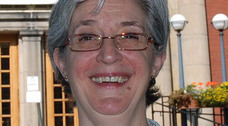11-10-2007

Puisant dans de solides réserves de dynamisme et de détermination, Cathy Viberg lutte contre les préjugés depuis 31 ans, autant à titre d'infirmière que comme bénévole au Douglas. Bien que Cathy ait pris sa retraite au mois d'août dernier, de son poste de chef clinico-administratif de l'unité de réadaptation intensive du CPC3, elle laisse derrière elle des acquis dont tout professionnel de la santé mentale serait fier.
L'engagement de Cathy à l'égard de la santé mentale a débuté alors qu'elle était dans la vingtaine. « En 1971, j'étais étudiante en sciences infirmières et j'ai été envoyée au Douglas pour poursuivre ma formation. La première chose que je me souvienne avoir vue, c'est la barrière qui entourait les terrains de l'institution. Cette clôture isolait le Douglas de la communauté et donnait à l'établissement un air peu accueillant. Cependant, dès que j'ai eu franchi la barrière et commencé mon travail, j'ai tout de suite apprécié. J'ai réalisé que le Douglas était un endroit où je pourrais faire ma marque. »
Rapidement, Cathy démontra des capacités de leadership et fut nommée, en 1979, infirmière en chef du pavillon Newman, lequel, à l'époque, prodiguait des soins à 40 hommes et 40 femmes. Elle a, par la suite, occupé de nombreux postes au Douglas.
Musique, artisanat et travail d'équipe
Fervente partisane des activités de réintégration dans la communauté, Cathy et son équipe de l'unité du CPC3 sont devenues des expertes de collectes de fonds en organisant des ventes d'artisanat en collaboration avec les employés du Douglas et les groupes communautaires. Aussi, Cathy et son équipe donnent un coup de main à Terry Williams, assistante en réadaptation à l'unité CPC3, dans la planification des concerts annuels présentés par Suzuki Montréal. Cathy explique avec fierté : « Nous utilisons les sommes recueillies pour emmener les patients dans la communauté et les informer des services disponibles. Il ne faut surtout pas oublier le plus important, leur rappeler comment on peut s'amuser! »
Sous le leadership de Cathy, l'équipe du CPC3 a également accompli une tâche impressionnante en mettant sur pied, en 2005-2006, le modèle de soins intégraux dans l'unité, ce qui a mené à une amélioration de la qualité de vie des patients et a permis de grandement augmenter le nombre de congés, passant de 19 en 2005-2006 à 54 patients pour l'année 2006-2007.
Cathy a également fait du bénévolat pour AMI-Québec au cours des années 90, en organisant des séminaires sur la santé mentale pour les employés de l'organisme. De plus, c'est avec fierté qu'elle a servi les patients du Douglas à chaque barbecue annuel, jusqu'à ce que cet événement prenne fin, en 2006.
Quel travail difficile…
Trop souvent, lorsqu'elle dit qu'elle travaille au Douglas, Cathy est confrontée à des réactions négatives, parfois même de la part de collègues professionnels de la santé. Un jour, un oncologue lui a dit : « Oh! mon Dieu! Quel travail difficile! Je serais certainement incapable de le faire. » Intérieurement, Cathy pensa : « Vous travaillez auprès de personnes cancéreuses et vous pensez malgré tout que la maladie mentale est trop difficile? Manifestement, vous ne vous rendez pas compte jusqu'à quel point les traitements dont on dispose de nos jours pour soigner les maladies mentales sont efficaces. Si vous ne le savez pas, quelle doit être l'impression du grand public! »
L'un des préjugés les plus choquants auxquels Cathy ait été confrontée est peut-être celui de croire que le personnel infirmier travaillant en psychiatrie est victime de violences physiques au quotidien. Chaque fois qu'elle en a l'occasion, elle s'efforce de dissiper ce préjugé. « Aucun patient ne souhaite sortir de ses gonds. Le personnel du Douglas consacre beaucoup de temps à enseigner aux patients des solutions alternatives à la colère et à écouter leurs préoccupations, pour éviter qu'ils ne ressentent de la frustration. Cette stratégie, associée à une médication appropriée, fonctionne dans la vaste majorité des cas. »
Une nouvelle ère
Cathy est fière du nouveau statut d'Institut du Douglas. Elle croit que celui-ci permettra d'attirer de nouveaux talents dans le domaine de la santé mentale. Elle est également fière de plusieurs récentes initiatives du Douglas qui visent à diminuer les préjugés. « L'un de mes meilleurs souvenirs est lorsque 7 000 personnes de tous les milieux s'étaient rassemblées en 2006, avec leurs glacières, leurs parasols et leurs chaises pliantes, sur les terrains du Douglas, pour assister à un concert de l'Orchestre symphonique de Montréal. Tous ces gens avaient l'air si détendus, comme s'ils se retrouvaient au milieu d'un parc. Des gens souffrant ou non de maladie mentale s'étaient ainsi retrouvés côte à côte, unis dans leur amour de la musique. »
Cathy est optimiste quant à l'avenir : « Depuis que je suis arrivée, en 1976, d'étonnants progrès ont été réalisés. Petit à petit, les barrières, qu'elles soient réelles ou symboliques, disparaissent. »
En un mot ou deux…
Quel mot décrit le mieux la maladie mentale?
Espoir.
Quel film a eu le plus d'influence sur votre vision de la maladie mentale?
Un homme d'exception.
Comment préservez-vous un mode de vie équilibrée?
Je vis un jour à la fois.
Qui fait, à votre avis, un travail hors pair pour démystifier la maladie mentale?
L'assistante en réadaptation, Terry Williams, qui organise des concerts avec Suzuki Montréal et sensibilise les groupes communautaires aux réalités de la santé mentale. « Elle n'a pas peur de relever de nouveaux défis. »
Croyez-vous que le Douglas sera encore là dans 125 ans?
Oui, mais les soins communautaires occuperont plus de place.
Un mot pour décrire le Douglas?
Défis inépuisables.


